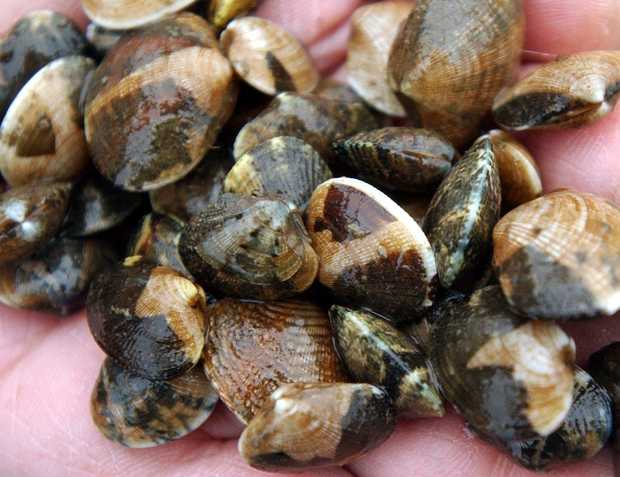
Ralph Solomon holds clams at the sea sea pond on the Lummi Reservation in this 2003 photo, shortly before the tribe reopened shellfish beds that were closed in 1996 due to poor water quality.
THE BELLINGHAM HERALD
By Kie Relyea, Bellingham Herald
LUMMI RESERVATION — Commercial shellfish harvesting is being banned on nearly 500 acres of Portage Bay for about half the year because of worsening water quality caused by fecal coliform bacteria, the Washington state Department of Health announced Tuesday, March 24.
Portage Bay is home to Lummi Nation’s ceremonial, subsistence and commercial shellfish beds.
State health officials last week changed the classification of nearly 500 of the 1,300 commercial shellfish harvesting acres in the bay from “approved” to “conditionally approved” because of water quality. That means harvesting in the conditionally approved area will be closed each year April through June and again October through December.
Those are the months when tests show the bay is affected by polluted runoff from the Nooksack River carrying higher levels of bacteria into the shellfish harvesting area, the state said.
The partial closure will remain until water quality improves, said Scott Berbells, manager of the growing area section for the department’s Office of Environmental Health and Safety.
The state’s action follows one taken by Lummi Nation in September, when the tribe closed 335 acres in Portage Bay to shellfish harvesting.
The tribe consulted with the state Department of Health and volunteered to do so Sept. 3 after levels exceeded federal standards for commercial shellfish harvest.
Those 335 acres are within the 500 acres downgraded by the state.
“This closure is devastating for the approximately 200 families on the Lummi Reservation who make their living harvesting shellfish,” Lummi Nation Chairman Timothy Ballew II said in a news release.
Fecal coliform bacteria come from human and animal feces. The bacteria enter Whatcom County’s waterways in several ways — horse and cow manure, pet and wildlife waste, and failing septic systems — and indicate there could be pathogens absorbed by the shellfish that may sicken people who eat them.
This isn’t the first time the tribe has closed its shellfish beds in Portage Bay because of fecal coliform pollution. It did so in 1996 because of high levels of fecal coliform in the Nooksack River and streams that empty into Portage Bay.
At that time, the state Department of Ecology and the Environmental Protection Agency led a cleanup plan using state legislation approved in 1998 that required dairy farms to undergo routine inspections and create written plans for how they would contain manure and prevent it from washing into public waterways. Before 1998, dairy farms were inspected only if a complaint was made about a farmer.
Failing septic systems and municipal sewage systems also were addressed.
The effort cleaned up the Nooksack River and its tributaries and allowed 625 acres of tribal shellfish beds to reopen in 2003, and the last 115 acres to reopen three years later.
“During the last 10-year closure, the tribal community lost jobs and millions in revenue. Ultimately, the closure affects all Lummi people because this shellfish area is sacred to our people and critical to our way of life,” Ballew said.
In recent years, the Lummis have expressed concern about water quality once again degrading because cuts to budgets and enforcement created regulatory gaps.
State officials also have been warning about worsening water quality.
“We’ve seen declining water quality in Portage Bay since about 2008. A number of stations have been steadily getting worse,” Barbells said.
Cleanup efforts are once again underway in the watershed.
In 2014, Whatcom County received funding from the EPA to strengthen a locally led effort to identify and clean up pollution sources.
Lummi Natural Resources, Whatcom Conservation District, and the state departments of Health, Agriculture and Ecology are working with Whatcom County and the Portage Bay Shellfish Protection District on the Portage Bay cleanup.
